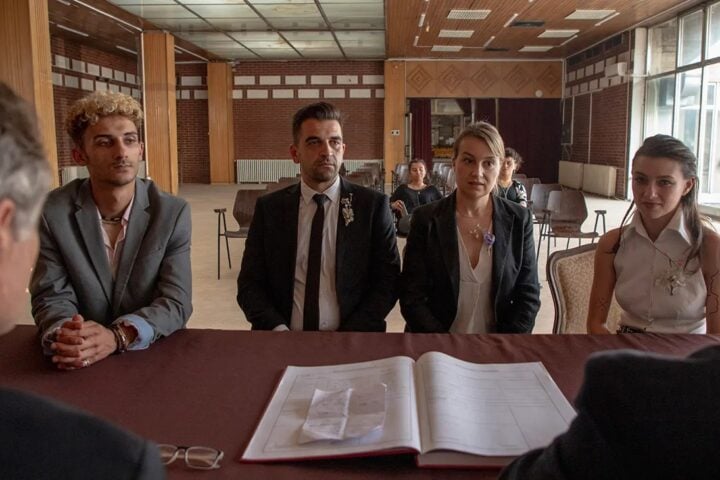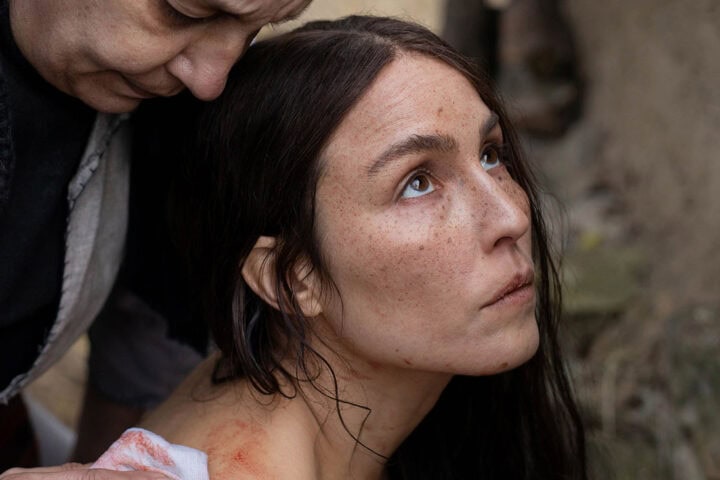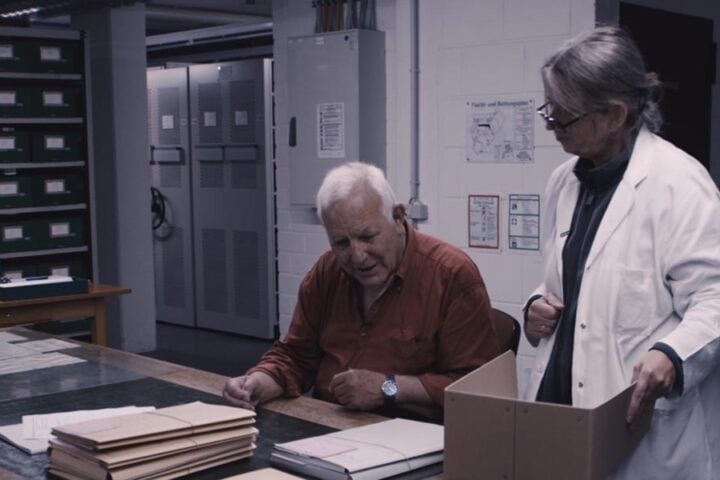The formula of the once-subversive gay male coming-of-age film has become familiar enough to viewers that it’s now a genre of its own: a period of initial angst in the life of a young protagonist is disrupted by some inciting incident—romantic, sexual, or both—that ultimately propels him into a rainbow-abundant future. And this is certainly the initial model for writer-director Goran Stolevski’s Of an Age as it explores the sexual awakening of Nikola (Elias Anton), nicknamed Kol, after he finds himself in the company of Adam (Thom Green), the older brother of Kol’s best friend and dance partner, Ebony (Hattie Hook).
The audience first meets a shirtless Kol spotlighted by an overhead lamp in the shadowy confines of his family’s garage just before he launches his body into a choreographed dance. He and Ebony are to perform at a competition later that morning until she interrupts his practice with a distraught phone call—she’s been out partying all night and has woken up alone in an unknown beachside location—and quickly sets a different type of day into motion.
Now begins the frantic mission to find Ebony and salvage the day, a quest that allows for Kol’s meet-panic with the cooler and more worldly Adam, who’s conscripted to help locate his mess of a sister. And when it becomes clear that making it to the competition is no longer in the cards, Kol gradually finds himself in the raptures of a sexual awakening as he and Adam discuss music, literature, and what the future might hold for two boys from small-town Australia.
The revelation of Adam’s sexuality midway through the search for Ebony—complete with the distantly remembered frustrations of fold-up paper maps, this being 1999—provokes knee-jerk code-switching in Kol as he reverts to bro-speak in the throes of a gay panic that he will later atone for with increasingly unrelenting affection. The claustrophobia of the car’s atmosphere is treated by Stolevski as a setting rife with both tension and intimacy, and the question of whether Kol and Adam will act on their attraction drives the film’s first chapter.
Just as in Andrew Haigh’s Weekend, another gay romance made intimate because of a ticking clock embedded into its core, Adam is set to leave for grad school the day after he meets Kol, so any connection they build will be fleeting. The accumulation of small details—glimpses of the Serbian immigrant experience through Kol’s muted relations with his conservative family, the erosion of his friendship with Ebony—provides a richly felt atmosphere for the love story to unfold as Kol’s tailspin of desire ultimately leads to his first sexual experience with Adam. And an achingly heartfelt and tearful goodbye in the light of the day precedes the beginning of the film’s second and final chapter 11 years later at Ebony’s wedding, when Kol encounters Adam at the airport and they rekindle the connection that had been forged all those years ago.
The durational balance between the films’ two sections—one almost languid in its commitment to the moment-by-moment experience of its characters, and the next only a short and painful shadow of that prior night together—is important to understanding its central motive. Adam seduces Kol in the backseat of the car at the end of the first chapter, unzipping his pants and going down on him for a few moments before Kol’s abrupt orgasm prompts a round of apologies regarding his relative inexperience. “I can come again,” he promises.
Adam knowingly confirms that Kol will come again, but in a way that implies not just that they’ll continue exploring their newfound physical intimacy. He seems to also be saying to Kol that there will be other boys, other bodies, other awkward climaxes in the company of relative strangers. In this way, Of an Age at first seems to be a love letter to our formative experiences, a look back at the thresholds between who we were before and who we’d yearned for so long to become—a time capsule of firsts, the world blossoming out from there.
But in the film’s closing scene, a monologue from Kol when he’s alone with Adam on the morning after Ebony’s wedding, seems to reorient the conventions that Of an Age has been following until now. The night spent with Adam in his adolescence seems to have haunted him in some singular way as he says, “I’ve met boys now. [But] they don’t know this feeling. Only me.” This would be a risky coda for the film to attempt, relying on our having felt that the prior chapter amounted to more than just one young man’s leveling up into the world of sexual experience in a story following the sweet and satisfying conventions that we’ve come to expect.
And maybe it did. Kol believes in the intensity of the love at the core of what the audience has been looking at mostly through the lens of lust—a very sweet kind of lust rooted in the joys and anxieties of having a crush unexpectedly reciprocated, but still something we imagine amalgamating over time into a broader personal story. Of an Age ultimately presents Kol’s love for Adam as either one of the greatest of all time, or perhaps more believably as a kind of tragedy, revealing him as having never moved past a universal formative experience that he’s since elevated in his mind into something transcendent and unparalleled.
The ambivalence with which the film treats Kol’s revelation proves rich with complication and offers a new intervention into a genre we thought we’d fully internalized, subverting the expectation that it depicts only a rite of passage, rather than something more complex and enduring. What happens when the coming-of-age story becomes the story of our lives?
Since 2001, we've brought you uncompromising, candid takes on the world of film, music, television, video games, theater, and more. Independently owned and operated publications like Slant have been hit hard in recent years, but we’re committed to keeping our content free and accessible—meaning no paywalls or fees.
If you like what we do, please consider subscribing to our Patreon or making a donation.




